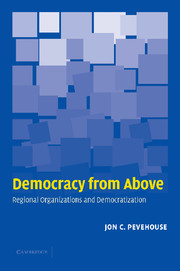Book contents
- Frontmatter
- Contents
- List of figures and tables
- Acknowledgments
- Abbreviations
- 1 Democratization and international relations
- 2 Regional organizations, the transition to and the consolidation of democracy
- 3 The supply-side of democratization and initial tests
- 4 Regional organizations and the transition to democracy
- 5 Regional organizations and the transition to democracy: evidence from cases
- 6 Regional organizations and democratic consolidation
- 7 Regional organizations and the consolidation of democracy: evidence from cases
- 8 Conclusion
- References
- Index
3 - The supply-side of democratization and initial tests
Published online by Cambridge University Press: 22 September 2009
- Frontmatter
- Contents
- List of figures and tables
- Acknowledgments
- Abbreviations
- 1 Democratization and international relations
- 2 Regional organizations, the transition to and the consolidation of democracy
- 3 The supply-side of democratization and initial tests
- 4 Regional organizations and the transition to democracy
- 5 Regional organizations and the transition to democracy: evidence from cases
- 6 Regional organizations and democratic consolidation
- 7 Regional organizations and the consolidation of democracy: evidence from cases
- 8 Conclusion
- References
- Index
Summary
Chapter 2 discussed how regional organizations encourage and protect democracy. This chapter continues the argument in three ways. First, I discuss the supply-side part of the argument: why we should expect only certain regional organizations to assist in the transition to and the consolidation of democracy. I then turn to which regional organizations are more likely to fulfill this role. Second, I examine the alternative hypothesis that great power preferences could be behind the relationship between regional institutions and democracy. Finally, I formally operationalize the two key concepts discussed so far: regional organizations and democracy. While doing so, I present descriptive statistics as well as some initial statistical tests of my hypotheses.
The supply-side of democratization
Chapter 2 discussed the variety of causal mechanisms linking regional organizations to democratization, and while the testing of the particular causal mechanisms will be left to case studies, it would be helpful to understand whether these processes occur in the aggregate. That is, across a variety of regions and time periods, does membership in regional organizations promote democratization and/or consolidation? While one could undertake a simple test of whether membership in a regional organization is associated with the transition to or the consolidation of democracy, since almost every state in the world is a member of multiple organizations, this proves to be difficult (Pevehouse, Nordstrom, and Warnke 2004). Moreover, intuition tells us that only some organizations are likely to perform any or all of the functions discussed in the previous chapter.
- Type
- Chapter
- Information
- Democracy from AboveRegional Organizations and Democratization, pp. 46 - 76Publisher: Cambridge University PressPrint publication year: 2005



